Arcadia Magazine Summer 2025: Sustained Global Excellence: Arcadia Abroad’s Better-Than-Before, Post-Pandemic Comeback
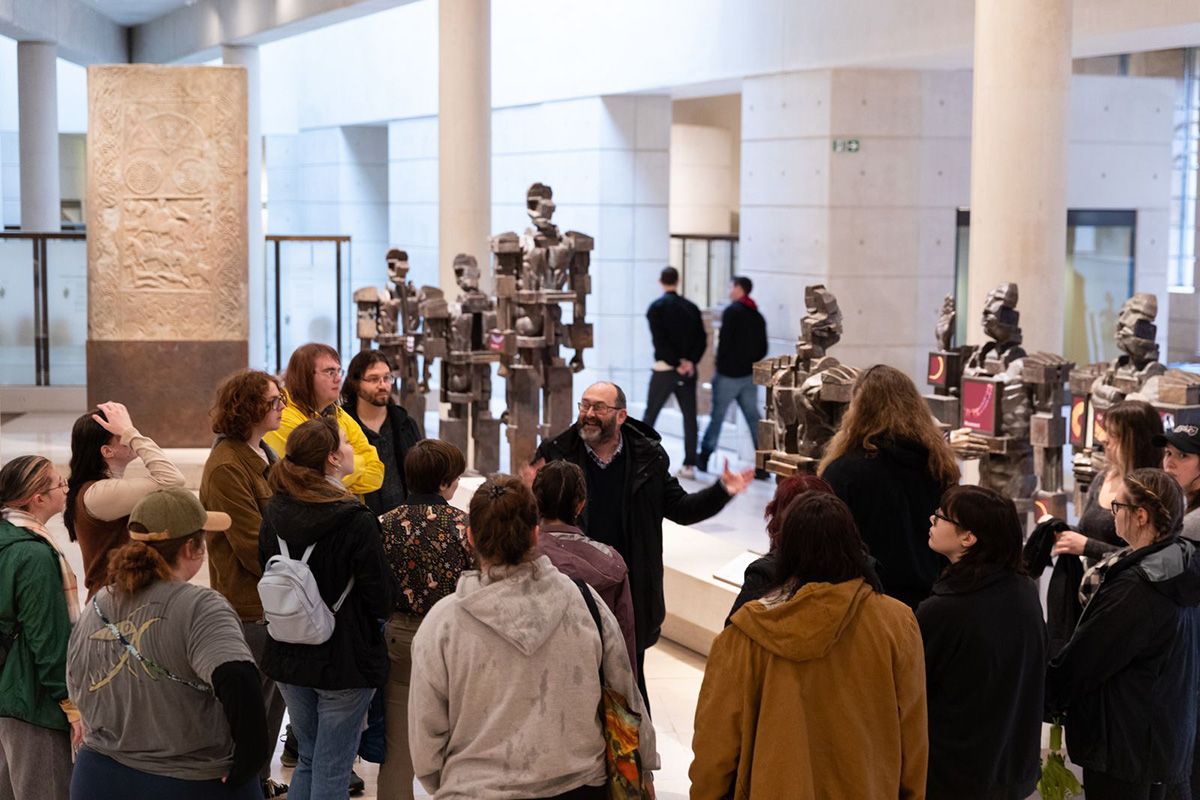
Arcadia Abroad’s director of Scotland programs Hamish Thompson got the call at 3 a.m. local time in Edinburgh.
Given COVID-19’s spread and impending travel restrictions, Thompson was told on that March morning in 2020, all 138 study abroad students under his watch had to head home right away.
“It was clear this was going to have a massive impact on society,” he says. “It was very uncertain what the mortality rate was going to be. We had to evacuate.”
Stateside, study abroad staffer Lisa Donatelli juggled getting students home, keeping their academics on track, and undertaking myriad other tasks even as she weighed the end of her long, beloved career.
“The stress was immense,” says the program’s now chief ofoperations, global programs and engagement. “Arcadia University could have easily chosen to simply eliminate our unit, as other universities were doing. Knowing this, I refinanced my mortgage and cashed out money in preparation for losing my job.”
The study abroad unit, housed at The College of Global Studies (TCGS) and branded as Arcadia Abroad, had long operated as a mostly stand-alone entity that contributed substantial revenue to the University’s budget. The pandemic shut off that stream of income practically overnight, threatening Arcadia Abroad’s viability.
The unit shuttered centers in Rome, Athens, and Barcelona and reduced domestic staffing by almost half. “It became a white-knuckle nine months,” says Jeff Rutenbeck, who served as Arcadia provost and senior vice president for academic affairs from 2019 until his retirement in 2025.
That bleak time could have been the beginning of the end for Arcadia’s storied international education program that dates to the post-World War II era. According to a September 2020 survey by Washington, D.C., nonprofit NAFSA: Association of International Educators, nearly 90% of 131 mostly higher-ed respondents didn’t send any students on foreign trips in fall 2020, resulting in losses of nearly $35 million. In addition, 38% said that staff positions would be impacted by canceled programs. For some outfits, COVID-19 would prove the last nail in their coffin, says Caroline Donovan White, NAFSA’s senior director of education abroad and volunteer engagement.
But not for Arcadia Abroad. In the five years since the pandemic, the study abroad organization has not only rebounded but in many ways prospered. “We took the opportunity to reimagine ourselves as a consulting partner working with institutions to offer solutions,” says Andrew D. Law, Arcadia Abroad’s chief executive officer. “We transitioned from a fairly traditional higher-education organization to an enterprise unit.
CREATIVE AND INNOVATIVE
According to White, organizations that “did well” despite the pandemic “had great stakeholder relationships, good communication within the office and with groups abroad. You have to be creative and innovative.”
Certainly, by many measures, Arcadia Abroad was that and then some. “Arcadia sustained excellence,” says Carolyn North, recently retired assistant dean for global learning at Hamilton College inClinton, N.Y. “We haven’t seen that everywhere.”
The organization, by all accounts, has helped a growing list of domestic colleges and universities return to study abroad in ways that address their challenges and advance their recruitment and retention priorities in a difficult environment. That means collaborations around new courses and internships, wrap-around support services, and rich experiences—all focused on keeping students at the center.
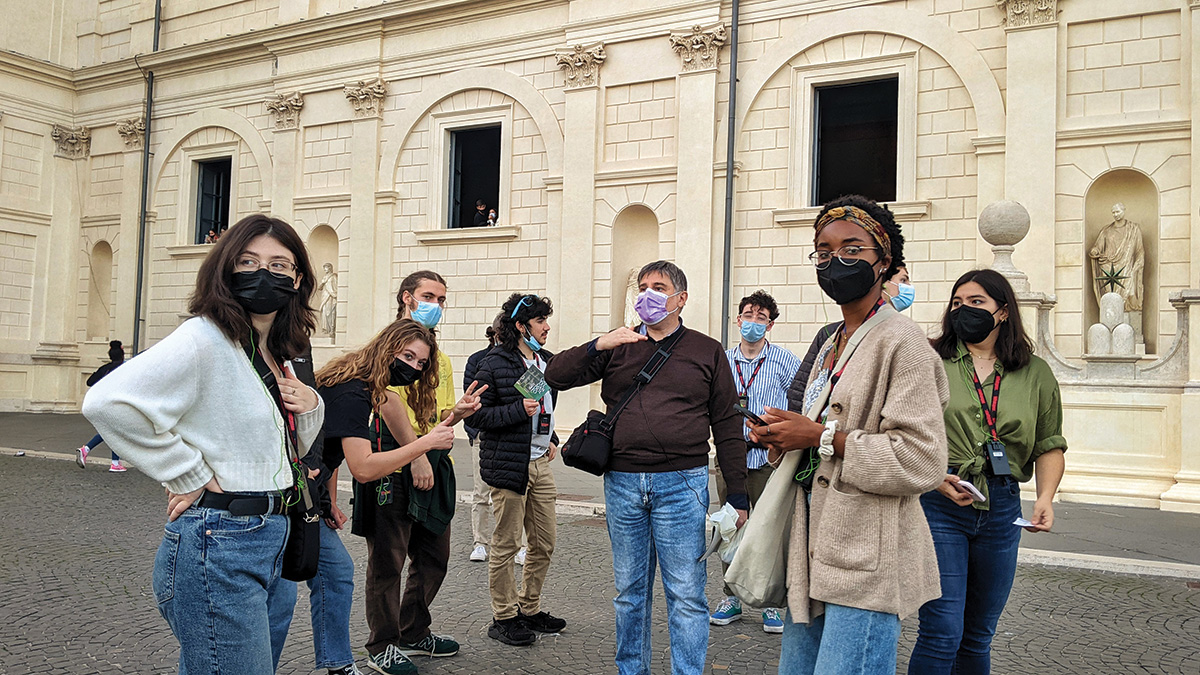
From the helm, Law set the tone. He approached the crisis with an optimist’s outlook: There will be a point when COVID ends, and Arcadia Abroad will be ready, he told staff. It was a can-do attitude that has delivered hefty dividends.
Enrollment, which dropped from the low thousands to practically zero at the pandemic’s apex, rebounded three short years later—and now exceeds pre-pandemic numbers by about 20%, Law says. Net revenue has nearly doubled from its pandemic bottom, he adds.
A reorganization along C-suite lines and elimination of redundancies between Arcadia Abroad and the University (such as two health and safety officers or separate finance teams) has led to a smaller domestic staff—about 80% of pre-COVID, Law notes. But it also encouraged closer connections to the University’s global missionand strategic plan, he says. At the same time, the early decision to invest in overseas staff proved crucial to Arcadia Abroad’s success and subsequent expansion, Law says.
“Dynamism, nimbleness, and innovation were what allowed us to survive COVID,” he says. “Overlaying that was a commitment to chart a new course.”
CAN WE? SHOULD WE?
Even as students returned home from country after country, fromItaly, the United Kingdom and Western Europe, then South Africa, and finally Australia and New Zealand, Arcadia Abroad was determined to ensure continuity, that courses were completed and credits earned.
“That’s no easy feat,” says John P. Fallon, the program’s chief of enrollment strategy and business development. “We had to invent how that would happen. It was a lot of all-day and late nights on Zoom calls.”
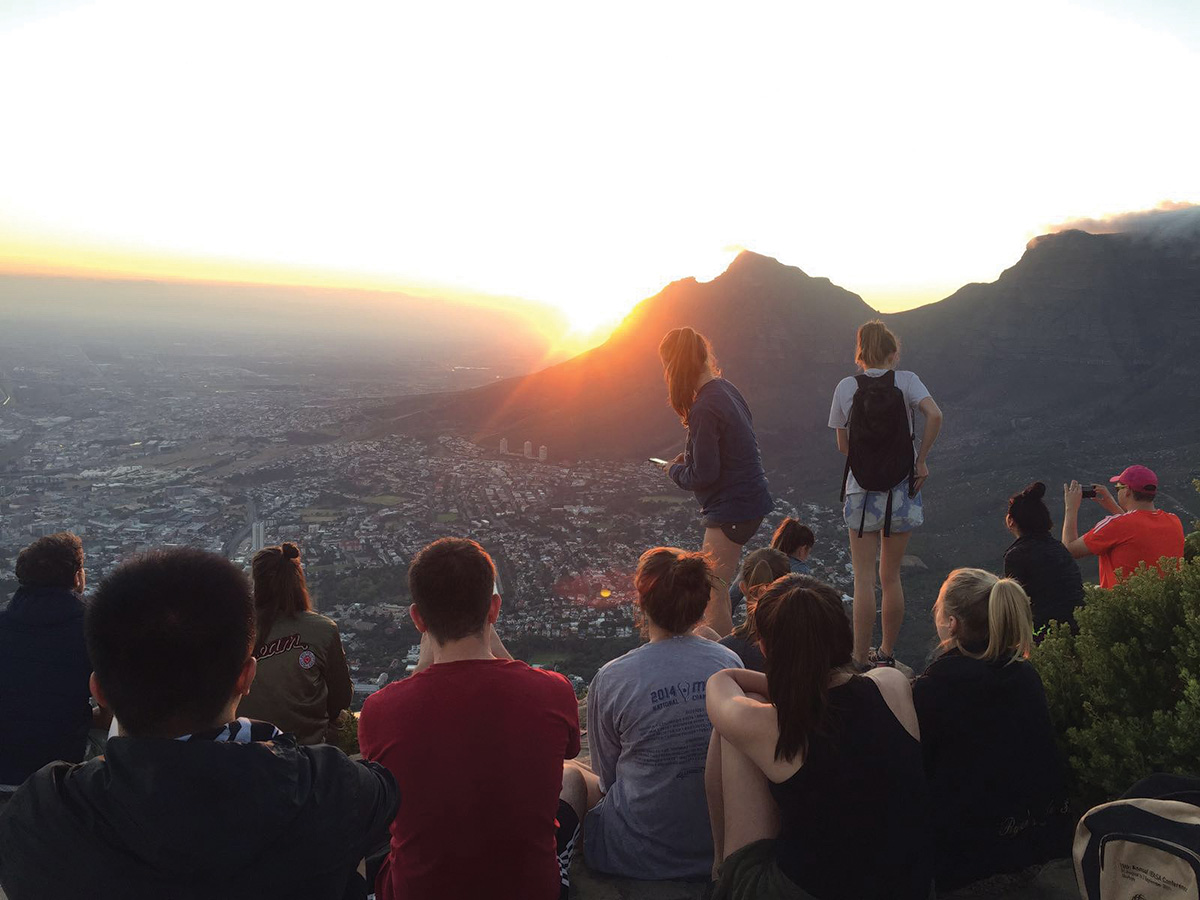
Arcadia worked with its local directors to figure out coursework and exam schedules as education shifted online. By the summer [2020], Arcadia Abroad went virtual, allowing it to stay open, and 27 students participated. “Our goal,” Law says, “was to recreate the kind of engagement we offered in country.”
“Arcadia: Virtual Europe” was built. Program faculty throughout Europe taught an online community of students, explains Paola Cascinelli, the Naples-based director of Arcadia Abroad Italy and Arcadia Abroad Online, who helped design the program. Participants got a taste of local culture through virtual excursions to museum sand landmarks, Zoom guest lectures by host country experts, and live event streaming. Arcadia also launched virtual internships, where students worked remotely for employers on web content creation, business development, communications, and more, Cascinelli says. A digital resume workshop was included.
While in-person internships have returned, Arcadia has continued the virtual option—a silver lining of the pandemic, she says. “Currently, a student studying in Perugia is virtually in Florence,” Cascinelli says. “A student studying in Ireland is virtually in the United Kingdom.”
Transparency was the watchword. Student safety, of course, was foremost, but ethical considerations also mattered. At the time, Hannah Leidich, director of global health, safety and student affairs for Arcadia Abroad, was not even a year as the assistant director. “It was surreal to have crisis on such a global scale,” she says, recalling a colleague remarking that a site hadn’t been evacuated since the Gulf War in 1990.
In an October 2020 blog post, Leidich asked two questions—“Can we?” and, perhaps more important, “Should we?”—as Arcadia weighed sending students overseas again. “How can we avoid contributing to over-burdened medical systems abroad?” she wrote.“ How will our students impact their host community?”
“We didn’t want to be that bullish American organization,” Leidich says.
Meanwhile, staff had to remain flexible. The internship coordinator in Australia became the social media coordinator; the U.S. academic records manager took on marketing content. A “Swiss-army-knife approach,” was adopted, Donatelli says. “We strove to find efficient and effective ways to work, and we collaborated like never before. We also threw in a bit of tenacity and ambition and a belief that we could achieve the impossible by rebounding in three years.”
Will Meehan of Concord, Mass., was one of 68 intrepid travelers to go to Arcadia Abroad’s reopened United Kingdom programs in fall 2020. The then-junior business and economics double major at St. Michael’s College in Vermont had written off traveling to Scotland when Arcadia notified him that the Edinburgh program was on.
Meehan had to quarantine initially and then suffered two more quarantines as COVID spread through his dorm. Classes were online, and popular overnight weekend tours gave way to day trips and outdoor activities, such as scavenger hunts, bicycling, and kayaking. Participants wore masks and practiced social distancing.
“The quarantine was terrible,” says the 25-year-old who works as a senior financial analyst for the TJX Companies that include TJ Maxx. “Even with that, I would do it again because of how amazing the rest of it was. Arcadia did everything it could to make the experience as good as it possibly could be.
VALUES AND AUTHENTICITY
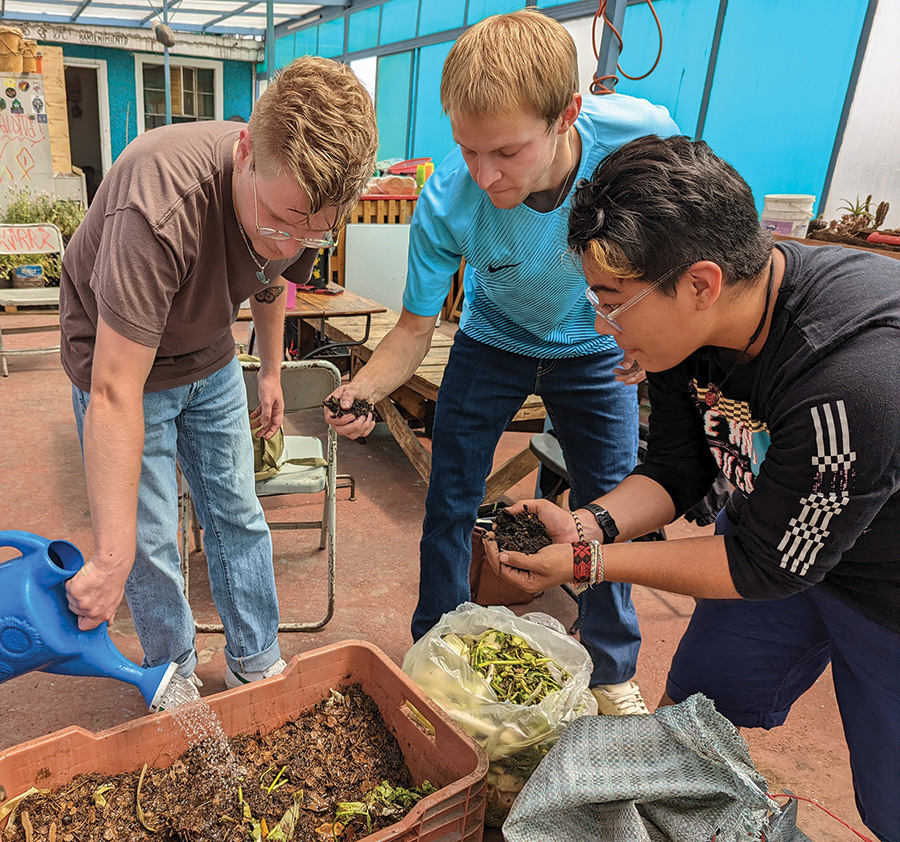
Through 2021, interest in going overseas, despite restrictions, began to climb. Fallon credits Arcadia’s reputation for health and safety, essential to managing the varied travel protocols of sending institutions.
The secret sauce, both the organization’s leadership and its partners say, was the experienced in-country staff that had relationships with local governments, police, and universities. “That’s where the magic happens,” Fallon says. “We’re working as solutionaries for students.”
Jeannie Simmons, director of global education at Ohio State University, has long appreciated Arcadia’s deep bench. “It’s not just, here are some classes,” she says. “It’s everything from A to Z, dealing with academics, finances, health and safety, student development.” It’s also meeting student demand for work experience through internships or summer research projects.
“I think this is where they were ahead of the curve.”
Since 2019, enrollment in Arcadia’s rigorous STEM Summer Research has exploded, growing 70% as of last year, says Rob Hallworth, associate dean of academic engagement at Arcadia Abroad. This year’s numbers are on target to be even higher, he adds. “It’s a unique experience,” Hallworth says, one that attracts students from places as diverse as Yale University, the University of Michigan, and Hamilton and offers projects around the globe. “You can get a glimpse of what your career in a lab might be. You might discover this is not what you want to do, which is just as important.”
Tara Chatty a biomedical engineering junior at Case Western University from the Austin area, was eager to experience life in another country. But finding classes that met the requirements of her demanding major proved difficult. The solution? Summer research with Arcadia Abroad. Last year, Chatty spent several weeks at King’s College London on a project that examined a robotic procedure for cardiac valve replacement.
Besides offering first-class services, Arcadia Abroad also innovated as it emerged from the pandemic. In a venture capital-fueled consolidating industry, it no longer made sense to depend solely on recruiting students to go abroad to its centers and programs, according to Law. “The business plan was that the higher-education sector is changing,” he says. “We were ripe for being vulnerable. The fact that we operated through COVID with clear values and authenticity was key.”
In 2022, Arcadia partnered with Augsburg University. For more than 45 years, the small school in Minneapolis has offered U.S. partner schools international education focused on human rights, democracy, and justice through its Center for Global Education and Experience (CGEE). The revenue-sharing collaboration was a way forward in an increasingly cutthroat environment, Law says, one that has enriched Arcadia’s portfolio and provided greater financial stability to Augsburg CGEE.
Take the school’s social justice and post-Apartheid program in Namibia and South Africa. Arcadia gets a presence on the continent despite closing its South Africa center, and Augsburg has a bigger pool of students to support its program both semesters. “We need each other,” says Patrick Mulvihill, the school’s assistant provost for global education and experience. “We get access to audiences we would never have reached, whole new cohorts of students who are more diverse, socio-economically, racially and ethnically, and geographically.”
Arcadia Abroad has also found additional creative ways to grow. It provides infrastructure support (health-and-safety, pre-departure orientation, housing) to ensure a smooth transition for Dartmouth College students enrolled at Queen Mary University of London. For LaSalle University, it serves as an off-the-shelf study abroad office. With Hamilton, Arcadia helped develop over more than a year the Trudeau Institute bioscience pilot in New York. Importantly, Arcadia has landed since the pandemic more than 125 new partner institutions that proved elusive in the past.
The program’s staff “rose to the challenge to take advantage of toeholds in the market,” Law says.
In addition, Arcadia’s strategic decision to work with clients to address specific challenges has led to a doubling in collaborative programs, says associate director Jacki Daddona, who heads the effort. Projects include curating lists of study abroad courses that meet specific requirements and price points, tailoring required classes to take advantage of overseas locations with local guest speakers and field trips, and identifying international universities that offer teaching practicum placements.
“You’re not only building a program with partners,” Daddona says, “you’re building trust.”
Arcadia Abroad’s better-than-before comeback, though, wasn’t only about the outstanding work of that team and continuity and innovation. It was rooted in what Dr. Rutenbeck calls adaptive change. “It’s a mindset and culture of doing more with less,” he says, “having a sharper focus on strategy and better execution in a highly competitive and unstable environment, and coming out on top.”
Finally, by 2023, “it was a return to normalcy,” Law says. You can almost hear him exhale. Enrollment jumped, and Arcadia Abroad had achieved the improbable—remaking itself in a short three years. This academic year [2024-2025], the program has exceeded pre-pandemic revenue numbers.
According to Law, three principles have guided the arc of the rebound: Use the London Center as a network hub for new ideas, such as providing internships to students enrolled at local universities; lean into facilitating direct enrollment while offering wrap-around services; and stay committed to access to study abroad for all students.
This last, he says, reflects a business model grounded in the values of the University, ensuring access for all students to study abroad and building inclusive communities. To that end, Arcadia has invested in a portfolio of programs (discounted to be priced at or below $15,750 a semester, about the same as on-campus costs) available to its Inclusive Excellence Coalition (IEC), made up of schools with endowments below $100 million and a student population of at least 35% Pell grant recipients.
Ohio Wesleyan University joined IEC in 2022, after a long relationship with Arcadia Abroad. “We’ve seen a notable increase in our need-based student population,” says Lisa Ho, the school’s associate director of international and off-campus programs. “We’re seeing seismic shifts in federal and state funding models. This is going to have lasting impact on students’ access to international education.” IEC, she says, was the impetus to create a study abroad affordable catalogue. Now zoology majors can access affordably a marine biology program in Australia, she says. “That was never the case before.”
AT THE CORE OF OUR MISSION
In 1948, seventeen Beaver College women traveled with an economics instructor and his wife to war-torn Europe and cycled through England, Belgium, and France to witness rebuilding efforts firsthand. It was one of the first study abroad experiences by a U.S. institution.
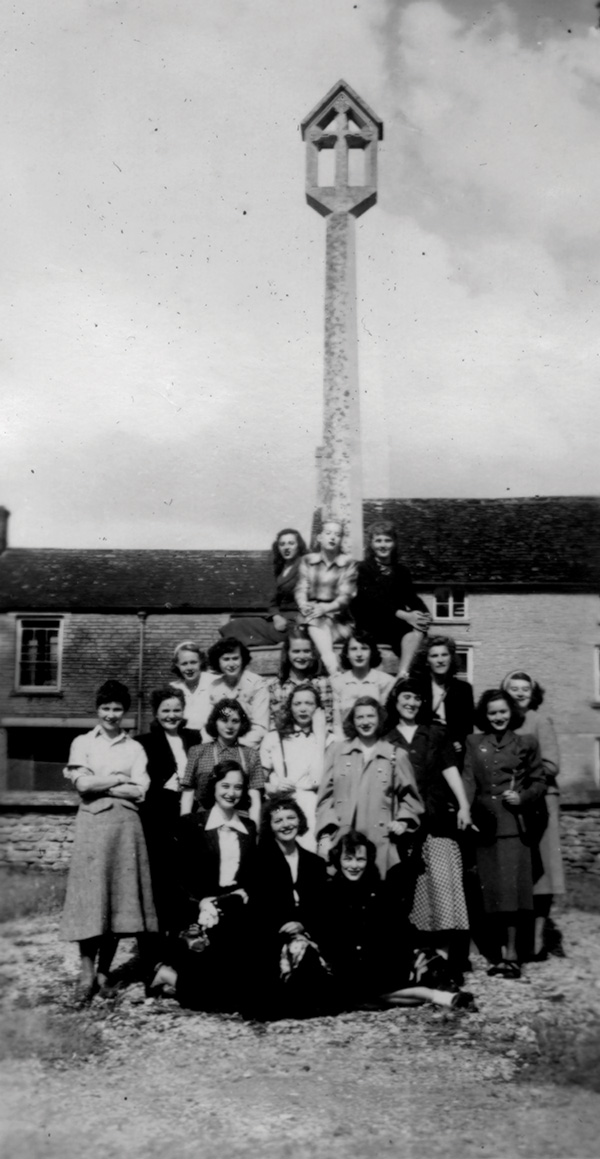
Since then, international education has become central to the University’s mission. In 1965, David Gray, an entrepreneurial English faculty member, started the Center for Education Abroad—an unusual relationship for a university. “Arcadia embraced it,” Law says. “Study abroad became a defining element of an Arcadia education.”
Now, Arcadia Abroad brings that same enthusiasm for studying around the world to other institutions.
Last fall, Washington University in St. Louis junior Avery Porter attended Queen Mary and, like those Beaver undergraduates, experienced an adventure. In the lead up, Arcadia Abroad, in its consultant role, helped refine her application, down to proofreading it, and pick classes that aligned with the English language and literature major’s goals. “Arcadia gave that personal, one-on-one advice,” says Porter, a native of St. Louis.
In London, local staff took students on tours and offered tips. “All those practical things I wouldn’t have ever known,” Porter says. Center staff checked in on her studies, and excursions—a Wales weekend of cliff climbing and jumping, for one—pushed her outside her comfort zone. “I would have never done that if I hadn’t signed up with Arcadia,” she says.
Arcadia Global Media Studies Caleigh Sechler ’27, of Allentown, Pa., spent last fall at the Arcadia London Center studying British media as preparation for her junior year at the University of Westminster. “My first study abroad showed me I could get to know people and make friends and it wouldn’t be just me, alone, in a whole country,” she says. “I’m much more confident.”S he also broadened her cultural horizons, shes ays, by going to “SIX,” the musical about Henry VIII’s wives. “I found out I love theater.”
Clearly, Arcadia Abroad—and its essential value first espoused 77 years ago—is thriving.
“Study abroad is committed to a global education, to seeking different perspective sand, we hope, having a transformative impact on students,” says Thompson of the Scottish programs.“It is at the core of our mission. That is our strength. That is our history and our values.”

